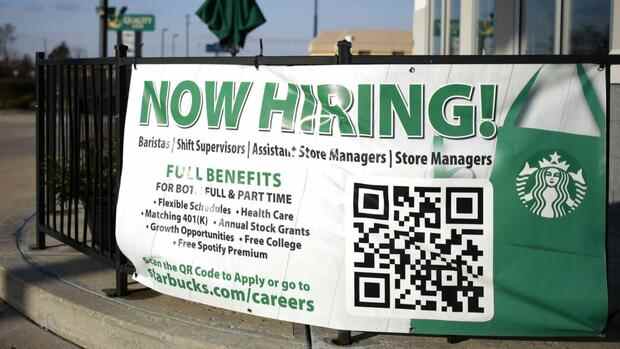The coffee chain has abolished vaccination requirements for employees. The lack of employees in the low-wage sector may have played a role in the decision.
(Photo: Bloomberg)
new York When Starbucks abolished vaccinations for its baristas last week, even former Trump spokesman Sean Spicer spoke up: “I didn’t expect that,” he tweeted. This also applied to the many customers who subsequently called on social media to avoid the coffee chain using the hashtag #BoycottStarbucks.
While in Germany a general obligation to vaccinate the population is being discussed, in the USA the obligation to vaccinate affects employees of public and private companies. In early November, US President Joe Biden ordered that all companies with more than 100 employees must ensure that their employees are vaccinated or tested weekly.
But then Republican states sued the Supreme Court, which ruled the rule unconstitutional this month. Except for hospitals, which receive public funds from the health insurance companies.
Now, in many states, companies are free to choose whether to require their employees to be vaccinated. An election with consequences that are difficult to assess, as the Starbucks example shows. The coffee chain introduced compulsory vaccination immediately after Biden’s announcement and has now backed down. The labor market in the low-wage sector is currently empty, and hiring unvaccinated people could at least partially alleviate this problem.
Top jobs of the day
Find the best jobs now and
be notified by email.
One of the biggest proponents of compulsory vaccination is United Airlines CEO Scott Kirby. In the company, 99.7 percent of the employees were vaccinated, the others had to go. Kirby sees this as a success: “While we have 3,000 infected United employees, not a single one of our vaccinated employees is currently in the hospital,” he wrote in an open letter to the workforce.
United Airlines CEO: Eight to ten fewer deaths thanks to compulsory vaccination
“Prior to mandatory vaccination, tragically more than one United employee died each week from Covid,” he wrote. But now there have been no Covid deaths for eight weeks in a row. “That means there are around eight to 10 United employees alive today because we made vaccinations compulsory.”
Individual cities and states do not want to give up the advantages of compulsory vaccination and are sticking to their rules. The city of New York, for example, makes vaccination or testing compulsory for all companies – no matter how many employees they have.
Wall Street, too, will continue to rely on vaccinations over testing when bankers return to offices in the coming months. Most recently, Jamie Dimon, CEO of America’s largest bank JP Morgan Chase, increased the pressure on his employees. “You have to be vaccinated to come to the office. And if you’re not vaccinated, you can’t go to the office,” Dimon said on CNBC in mid-January. “And we won’t pay you if you don’t work from the office.”
The bank has mandated vaccinations for employees and visitors in nine New York offices, along with many other financial institutions. At 97 percent, the majority of employees have already been vaccinated. Unlike in Germany, employers had the right from the start to ask about the vaccination status and not to let unvaccinated people into the office.
Dimon is an advocate of the culture of presence and ordered his employees back to the offices early. However, the vaccination requirement only applies to New York, where the number of cases was extremely high. JP Morgan Chase wants to decide for each location individually.
“We deliberately don’t want to be consistent here,” says Dimon. “There are different laws and requirements in different cities and states, so we will adapt locally.”
Citigroup was less flexible there. Employees without a second vaccination had to go on unpaid leave on January 15th and will be fired on January 31st. HR manager Sara Wechter said on LinkedIn that 99 percent of the employees had met the requirements. In individual cases, the bank allowed exceptions. She did not say whether and when Citigroup would also require the booster vaccination.
Even if the disease authority CDC sticks to its definition that people with two mRNA vaccinations are considered fully vaccinated, companies also make their own rules.
Facebook parent company Meta and the private equity house Blackstone, for example, are already demanding a booster to enter the offices. Goldman Sachs will start requiring boosters for employees and visitors on February 1st.
More: Does he lose his good reputation? The seven problems of Karl Lauterbach
